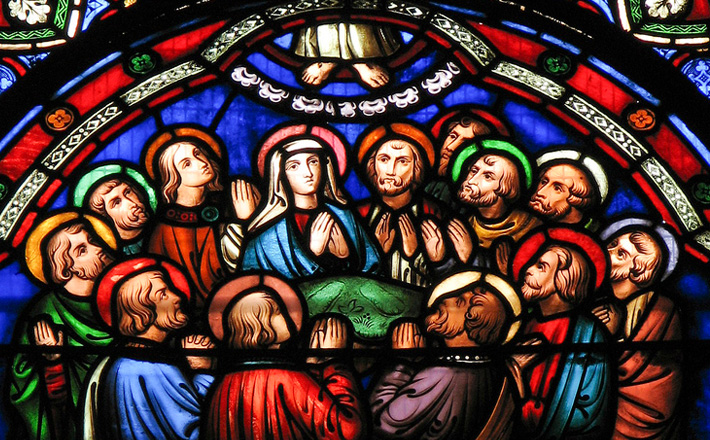Commentary on John 17:1-11
The Gospel of John depicts a very “sinful, evil, world,” a system of human governance that moved contrary to the values of God and his Kingdom.
It can be debated what the Gospel’s authors sought to articulate during this time. Our perspectives about their purposes, approaches, and the manner in which they related the story of Jesus, will greatly influence how we read the Gospel in general.
Some scholars have suggested that one of the emphases of John’s Gospel is that Jesus was killed because of the good works he performed. They point out that Jesus’ acts were Messianic “good works” rather than simple acts of charity. The late Mexican biblical exegete, José Porfirio Miranda, suggested that from a literary perspective, Jesus refused to perform the first miracle (i.e. good work) as requested by his mother, Mary, in the wedding of Cana, because the “hour” for him to die had not yet come.1
The eleventh chapter of John tells us that Jesus had the “audacity” to raise Lazarus from the dead (good work), and John informs us that the religious leaders decided Jesus had to be killed. The Gospel of John underscores the point that the leaders of the day challenged the light of righteousness that not only exposed evil, but also offered an alternative path to living and governing the world. This light that could not be extinguished was the incarnate Son of God, Jesus.
Good works of justice, mercy, and equality were in stark opposition to a world in darkness. This must have created a sense of insecurity for the disciples. In all probability, the priority for this community must have been to safeguard against the dangers of the world around them. How would one support and protect the individuals who labored for the establishment of the Kingdom? Jesus knew that his time was limited. Prayer was needed and welcomed by the disciples of that community. Jesus prayed for his beloved, specifically petitioning for unity among them.
The renowned New Testament scholar, Ernst Käsemann suggested that Jesus’ prayer was a divine revelation: his prayer moved from being a petition to actually an “address, admonition, consolation, and prophecy.”2 I disagree with Käsemann regarding Jesus’ prayer, because it seems there is nothing in the text to suggest this perspective. Furthermore, Käsemann’s theological perspective seems to diminish the human, as if Jesus was above praying. If discourses and prayers can only be legitimate if emanating from divinity, this infers that Jesus’ humanity could be in question.
I think Jesus’ prayer should be accepted for what it was — a sincere petition asking for the help that his loved ones needed at that time and would need in the future. This certainly showed his humanity and his continued relevance to real, flesh and blood people. It seems that Gnostic ideals continue to influence our theologies, biblical hermeneutics and other philosophical beliefs.
The Gospel of John may pose certain challenges for preachers in the 21st century. One challenge has to do with the concept of “evil” in the “world.” The modern/post-modern world in which we live seems to have moved away from beliefs about evil in the world that originated from “primitive” societies. These ideas may seem irrelevant in our age, but are ironically more relevant today than ever. In our time, the prosperity theologies and/or psychological theologies of positive thinking make it unfashionable to even use the word sin.
I see an exaggerated emphasis on human triumphalism over evil, a concept which has taken a stronghold in 21st century thought. Despite signs to the contrary, indicating that the world is not necessarily heading towards a better future, the vestiges of enlightenment hope and the triumph of reason, generating peace and prosperity, persist. As a result, any ideas or prophetic voices that might proclaim the need for radical change, renewal, and redemption are challenged.
The early church developed in a situation of persecution, and in many ways, finds itself there today. The emphasis on the existence of principalities and powers should continue to be an essential component of the message of the church. In Spanish, there is a statement that comes to mind when I reflect on Jesus’ prayer: “El pueblo unido jamás será vencido.” (A united people will never be defeated.) The challenge to live in unity is a great one. It is difficult to keep people on message, and the church has a long history of schism.
If the emphasis on unity can be seen in Jesus’ prayer, then we can conclude that he was aware that keeping his beloved united was a challenge. Without cohesion, they would not survive. In an environment of persecution and evil, the church, then and now, faces many challenges. A prayer from Jesus asking for protection via unity of the church, provides a great source of comfort to his followers.
Preachers can emphasize that Jesus’ prayer in the Gospel of John is powerful because it emerges from his personal experiences as a man. It is contextually based. When a parent prays for his or her child, we know that the motivations behind that prayer are deep and primal. Likewise, the deeply loving petition in our favor requested by Jesus is greatly treasured.
Notes:
1. José Porfirio Miranda, Being and the Messiah: The Message of John (Maryknoll, NY: Orbis Books, 1973).
2. Ernst Käsemann, The New Testament of Jesus according to John 17, translated by Gerhard Krodel (Philadelphia: Fortress Press, 1968).


May 28, 2017